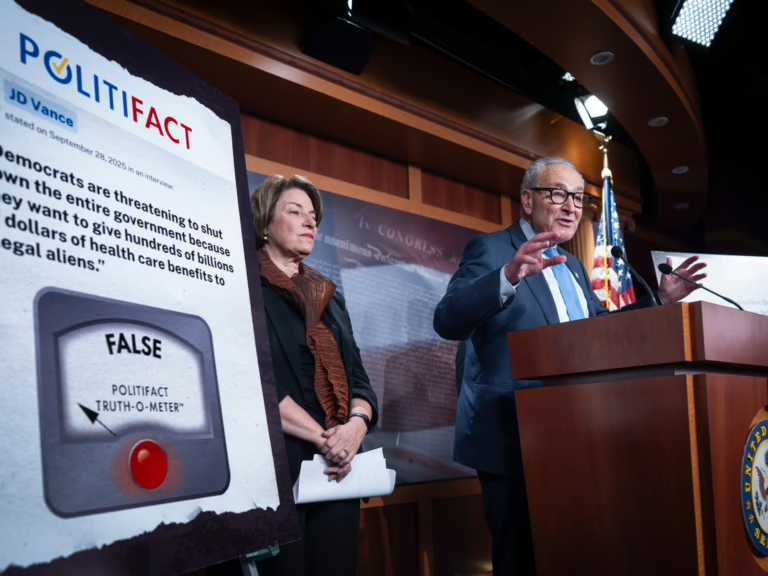“The government shutdown saga drags on.”
Senator John Kennedy of Louisiana succinctly captured the mood on the third day of the US government shutdown with a tone of weary resignation.
Related Articles
list of 3 itemsend of list
On Friday, the Senate reconvened briefly before the weekend break to once again vote on a continuing resolution aimed at funding the government through November 21.
Republicans have promoted this measure as a “clean” funding bill that would maintain current spending levels. However, Democrats have stood firm, refusing to consider any proposal that excludes provisions addressing healthcare funding.
With Affordable Care Act subsidies set to expire by year-end, many Americans face the prospect of rising insurance premiums. Democrats have urged Republicans to reconsider recent Medicaid cuts enacted earlier this year, which tightened eligibility for the program that supports low-income families.
This disagreement has led to a stalemate in Congress, with both parties trading accusations and no clear path forward. The frustration was palpable on both sides.
Senator Kennedy expressed his exasperation bluntly from the Senate floor: “This shutdown is profoundly senseless.”
For the fourth time on Friday, Democrats voted down the Republican proposal, which had already passed the House along party lines.
Only a few senators broke ranks: Democrats Catherine Cortez Masto of Nevada and John Fetterman of Pennsylvania, along with Independent Angus King of Maine.
On the Republican side, Senator Rand Paul also dissented, citing concerns over the impact of increased spending on the national debt.
The final tally was 54 in favor and 44 opposed in the 100-member Senate, falling short of the 60 votes needed to overcome a Democratic filibuster and advance the bill.
In response, Democrats introduced their own bill proposing over $1 trillion in healthcare funding, but it too failed to gain sufficient support in the Senate.
Blame Game on Capitol Hill
Following the votes, Senate Minority Leader Chuck Schumer held a press conference, insisting that the deadlock would only end if Republicans shifted their approach and engaged in negotiations over healthcare funding.
“The Republicans played the same card today and got the same outcome. The question is: Will they alter their strategy?” Schumer asked reporters.
He criticized Republicans for squandering a week with four failed votes.
“My caucus is unwavering in our commitment to safeguarding Americans’ healthcare,” he said. “Instead of negotiating and reopening the government, the White House and Republican colleagues have chosen to inflict maximum pain with this shutdown.”
Republican leaders, in turn, accused Democrats of obstructing progress by refusing to accept the current funding levels.
House Speaker Mike Johnson emphasized the need to reform programs like Medicaid.
“Medicaid has been plagued by fraud and misuse, which is why we implemented reforms-to improve health services for Americans,” Johnson stated at a news briefing. “There were many individuals on Medicaid who were never meant to be eligible.”
Johnson also suggested Schumer’s stance was influenced by upcoming primary challenges within the Democratic Party, saying, “He needs to demonstrate he’s standing up to Republicans.”
Despite the political sparring, both parties expressed concern for federal employees affected by the shutdown.
The Congressional Budget Office estimates that nearly 750,000 federal workers are furloughed daily during the shutdown, while others continue working without pay.
The daily cost of furloughed employees’ lost wages is approximately $400 million. Thanks to the Government Employee Fair Treatment Act of 2019, these workers will receive back pay once the shutdown ends.
Strategic Maneuvers
In a move to pressure Democrats into passing the continuing resolution, Speaker Johnson announced on Friday afternoon that the House would not return to session until at least October 14.
Instead, members were instructed to focus on “district work periods” outside Washington, D.C.
This decision was intended to compel the Senate to act on the funding bill already approved by the House. Before this announcement, the House was expected to resume on October 7.
Meanwhile, Senate Majority Leader John Thune expressed openness to discussing Democrats’ healthcare concerns-but only after the government reopens.
He stopped short of promising that the expiring healthcare subsidies would be renewed if Democrats agreed to end the shutdown.
“We can’t guarantee the votes to extend COVID-related subsidies, but I’m willing to talk with Democrats about solutions,” Thune said. “However, these discussions can’t happen while the government remains closed.”
Meanwhile, Republican President Donald Trump has threatened to use the shutdown as leverage to reduce the federal workforce and cut funding for programs in Democratic-leaning areas.
This week, his administration announced the suspension of $18 billion in infrastructure projects in New York City, including Hudson River tunnel work, as well as $8 billion in clean energy funding.
On Friday, Russ Vought, director of the Office of Management and Budget, revealed that Chicago would also face cuts, with $2.1 billion in infrastructure projects paused to prevent “race-based contracting.”
At a press briefing, White House Press Secretary Karoline Leavitt confirmed plans to reduce federal employment, with Vought meeting agency heads to discuss potential layoffs.
“If Democrats do the right thing, the shutdown can end, our troops can be paid, and government business can resume,” Leavitt said. “But if the shutdown persists, layoffs will be an unfortunate consequence.”
Democratic leaders dismissed these threats as distractions from the core issue of healthcare funding.
Schumer reiterated that healthcare is a priority for constituents in Republican districts as well, urging GOP leaders to respond accordingly.
“It’s straightforward,” Schumer concluded. “They can reopen the government and make healthcare more affordable simultaneously.”

















